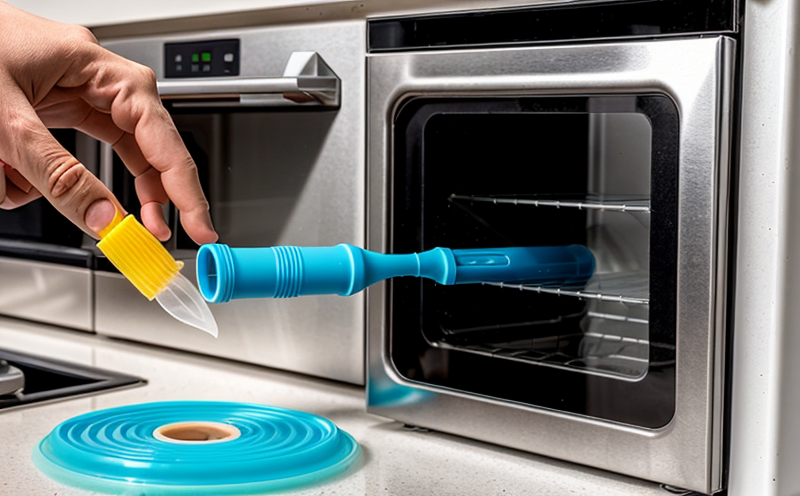ISO 178 Flexural Strength Testing of Household Plastics
The ISO 178 standard provides a comprehensive framework for determining the flexural strength of materials, including household plastics. This test is essential for ensuring that plastic products such as containers, utensils, and other everyday items meet safety and performance standards. Understanding the flexural strength allows manufacturers to optimize their product designs, enhancing durability while maintaining functionality.
The flexural strength test involves applying a load until a specimen breaks or deforms beyond acceptable limits. For household plastics, this can be crucial for determining how these materials will perform under typical use conditions. Household plastics often come into contact with food, water, and other substances that could affect their integrity over time.
The methodology outlined in ISO 178 ensures consistency and reliability across different laboratories. This includes precise control of temperature, humidity, specimen dimensions, and loading rates. The test is conducted using a four-point bend method or three-point bend method, depending on the specific requirements for the plastic being tested.
Specimen preparation plays a critical role in achieving accurate results. Specimens must be cut to standardized dimensions and polished if necessary. This ensures that all specimens are comparable and that any differences observed can be attributed to intrinsic properties rather than external factors. Proper specimen preparation also helps prevent premature failure due to edge effects.
The choice of testing machine is equally important. High-quality machines equipped with accurate load cells, displacement sensors, and temperature control capabilities provide reliable data. The machine should be capable of applying loads up to the specified limit for the test while maintaining precision throughout the entire process.
Once the test is completed, the results are analyzed according to ISO 178 guidelines. These standards define what constitutes acceptable levels of flexural strength based on factors such as material type and expected application. Compliance with these criteria ensures that household plastics meet industry expectations regarding durability and safety.
In summary, ISO 178 flexural strength testing provides valuable insights into the mechanical properties of household plastics. By following this rigorous procedure, manufacturers can ensure their products are safe, reliable, and capable of performing well under real-world conditions. This testing not only enhances product quality but also contributes to consumer confidence in the safety and efficacy of everyday items.
Eurolab Advantages
EuroLab stands out as a premier provider of household plastics testing services, offering unparalleled expertise and cutting-edge facilities. Our team comprises highly skilled professionals who are well-versed in all aspects of ISO 178 flexural strength testing.
We utilize state-of-the-art equipment designed specifically for this type of testing, ensuring accurate and repeatable results every time. Our laboratories adhere strictly to international standards, guaranteeing compliance with regulatory requirements. This level of precision is crucial for maintaining consistent product quality across various applications.
At EuroLab, we understand the importance of timely delivery and clear communication throughout the entire testing process. From initial consultation through final report generation, our clients receive personalized attention tailored to their unique needs. Whether you need basic compliance checks or comprehensive research studies, we have the resources and experience necessary to deliver exceptional service.
In addition to technical excellence, EuroLab prides itself on fostering long-term relationships with its customers. By providing ongoing support and advice based on our extensive knowledge base, we help businesses stay ahead of industry trends while ensuring they meet all relevant standards.
Why Choose This Test
The ISO 178 flexural strength test is particularly valuable for household plastics due to its ability to assess how these materials will perform under stress. Understanding the flexural strength helps manufacturers design products that are both robust and user-friendly.
This testing can reveal important information about a plastic's resistance to bending forces, which is critical when dealing with items like containers or utensils. It allows companies to identify potential weaknesses in their designs early on, enabling them to make necessary adjustments before production begins.
Moreover, this test ensures that household plastics meet strict safety standards set forth by regulatory bodies worldwide. Compliance with these regulations protects consumers from harmful materials while promoting trust within the marketplace.
The results of ISO 178 testing can also be used during research and development phases to improve product performance. By identifying optimal material combinations or optimizing manufacturing processes, developers can create more efficient and effective products.
Finally, having accurate flexural strength data provides valuable input into lifecycle assessments. Knowing how long a plastic component is expected to last under various conditions allows manufacturers to plan for replacement cycles effectively.
International Acceptance and Recognition
The ISO 178 standard has gained widespread acceptance among nations around the globe, reflecting its relevance and reliability in evaluating flexural strength. Many countries have adopted this standard as part of their national testing protocols, ensuring consistency across borders.
Recognized bodies such as ASTM International (formerly known as American Society for Testing Materials) also support ISO 178 through supplementary guidelines tailored specifically to plastics. These additional standards further enhance the accuracy and applicability of flexural strength tests conducted according to ISO 178 principles.
The international nature of ISO 178 testing makes it ideal for multinational corporations operating in multiple regions. By adhering to these globally recognized standards, companies can ensure that their products meet local requirements without compromising quality or performance expectations.
Furthermore, compliance with ISO 178 helps businesses avoid costly delays associated with non-compliance penalties or recalls. It demonstrates a commitment to maintaining high-quality standards and upholding consumer safety.





